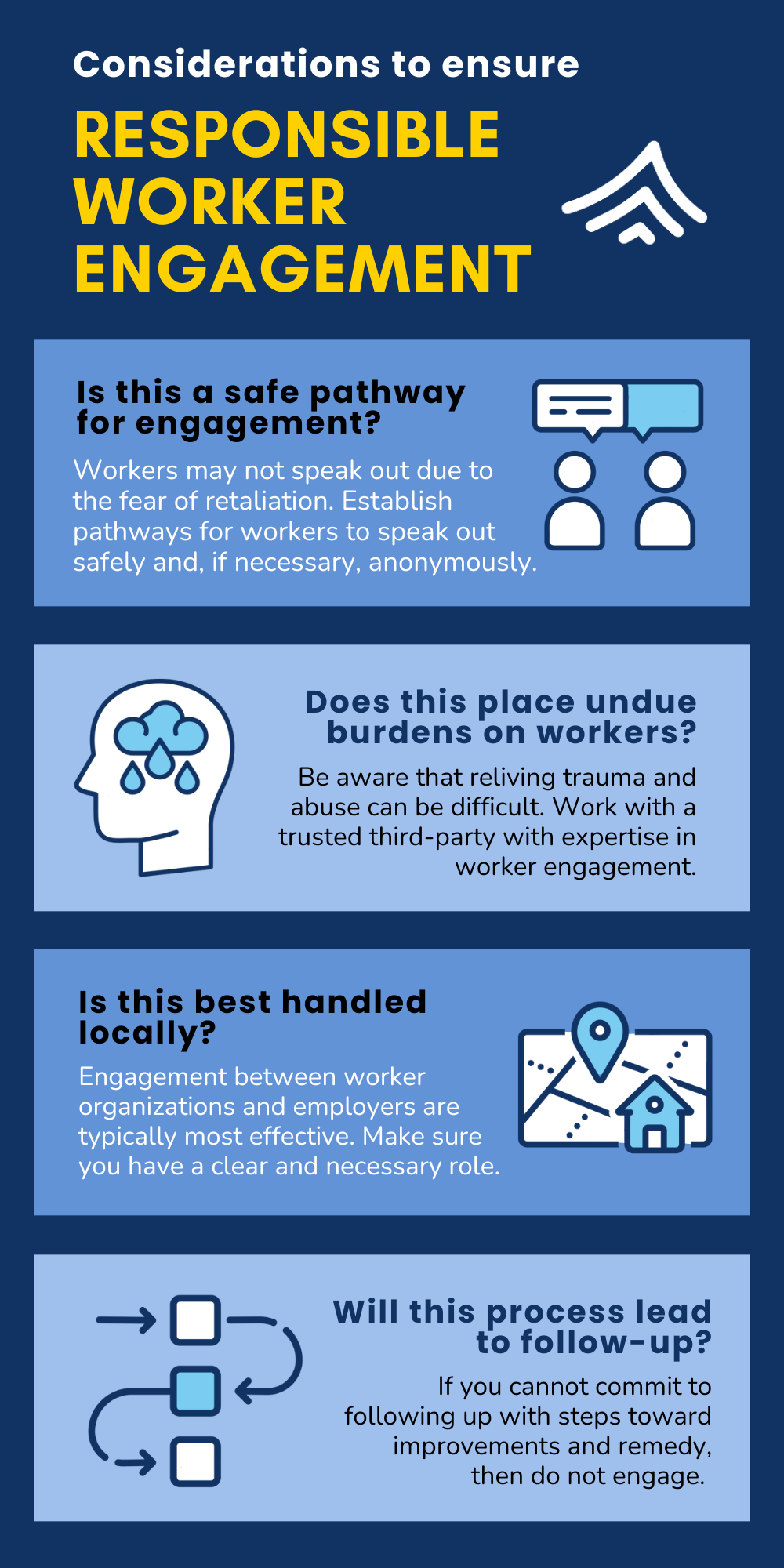Responsible Recruitment
When companies start with responsible recruitment and hiring, the rights of workers are respected.

In the seafood industry, workers are often recruited across borders to take up jobs at sea or in processing facilities. For many, the recruitment process is the most vulnerable point. If workers have had to pay fees to secure employment or are deceived about job conditions, they may enter supply chains already in debt or at risk of exploitation, well before they board a vessel or arrive at a plant.
Irregular or unethical recruitment practices—such as charging illegal or unfair fees, withholding passports, or using unlicensed brokers—can lead to debt bondage, forced labor, and a loss of agency. These risks are heightened in fragmented supply chains involving multiple jurisdictions, where legal protections may be weak or inconsistently enforced. In such environments, recruitment abuses are not rare. They are endemic.
Addressing recruitment-related risks is essential to respecting human rights and upholding international expectations, including the UN Guiding Principles on Business and Human Rights. Responsible recruitment also strengthens supply chain resilience, reduces legal and reputational exposure, and positions you to meet growing market and investor expectations around due diligence. When recruitment is conducted ethically—without fees to workers, with transparency, and through legal channels—both workers and businesses are better protected.
What Is Responsible Recruitment?
Responsible recruitment—also called ethical or fair recruitment—refers to concepts, initiatives, and supporting structures that uphold migration with dignity.
Governance gaps leave migrating workers and job seekers vulnerable to exploitation, so companies and governments must work together. Governments and regulators are increasing efforts to improve policies and combat recruiters and employers who use unfair and nontransparent practices. You can advocate for stronger regulations around recruitment. For example, support bilateral agreements between sending and receiving countries.
International Labor Organization (ILO) guidance stipulates that no recruitment fees or related costs should be borne by workers or jobseekers (although some exemptions exist).
To ensure migration with dignity and follow fair recruitment and employment practices, no worker should pay a fee to secure a job, workers should be recruited through legal and ethical processes, and the hiring process must include worker safeguards and transparency.
Employer Pays Principle
The charging of recruitment fees to workers in supply chains persists not only because of the vulnerability of migrant workers to exploitation, but also because of the complexity of labor-recruitment models. Labor supply chains often involve numerous parties and often function through informal relationships, where terms and conditions are poorly defined. This can make exploitative practices difficult to monitor and detect. Currently, costs associated with providing the services integral to recruitment are passed on to the workers via fees. These services include the sourcing, interviewing, documentation, placement, orientation, and transporting of workers.
ILO guidance stipulates that no recruitment fees or related costs should be borne by workers or jobseekers (although some exemptions exist). The Employer Pays Principle (EPP) is an employer commitment to pay the full costs associated with recruitment. This requires labor providers to work with their clients to agree on a sustainable price, which will allow them to cover the costs of recruitment so these are not passed on to workers. Businesses need to calculate the true cost of recruitment and agree on a markup to cover the labor provider’s overhead costs.
Why Responsible Recruitment Matters
The seafood industry relies on a large and often mobile workforce to produce, harvest, and process fish and other seafood products. For many workers, especially those migrating across borders to take these jobs, the recruitment process is one of the most vulnerable stages. Long before they reach a processing facility or board a vessel, workers may incur high recruitment fees or be misled about job conditions, exposing them to coercion, debt bondage, and abuse.
According to the ILO Fair Recruitment Initiative, common abuses during recruitment include:
- Deception about the nature or conditions of work
- Retention of identity documents
- Illegal wage deductions
- Recruitment-related debt that binds workers to their employer
- Threats or retaliation for attempting to leave or raise concerns
These risks are amplified in seafood supply chains that span multiple jurisdictions, particularly those operating at sea. With vessel owners, captains, flags, recruiters, and ports often located in different countries, assessing and enforcing legal compliance becomes complex, creating space for exploitation to occur.
Companies have both a responsibility and an incentive to act. The UN Guiding Principles on Business and Human Rights report outlines the ways you can respect internationally recognized human rights throughout your operations and supply chains, including in recruitment. Taking action to prevent recruitment-related abuse delivers four clear benefits:
- Reputational trust. Meet consumer, investor, and NGO expectations and protect brand credibility.
- Stronger supplier relationships. Reduce disruptions by working with more stable and responsible partners.
- Market access and investment readiness. Comply with requirements tied to trade and align with ESG benchmarks used by financial institutions.
- Operational resilience. Improve worker retention and productivity and reduce turnover or unrest linked to abuse.
Recruitment is the first link in the employment chain. When done poorly, it creates lasting harm for workers and real risk for businesses. Evaluating and improving recruitment practices helps address forced labor and human trafficking and build a socially responsible and resilient seafood supply chain.

Practical Steps to Implement Responsible Recruitment
To uphold responsible recruitment in your seafood supply chain, focus on six actions:
- Commit to the Employer Pays Principle. Ensure workers never pay recruitment fees. Cover all related costs—visas, travel, medical checks—and build this into supplier agreements.
- Vet recruitment partners. Only work with licensed, ethical recruiters. Conduct background checks and gather worker feedback before engagement.
- Set clear expectations. Provide suppliers and recruiters with written standards aligned with ILO guidelines. Include responsible recruitment in contracts.
- Monitor practices. Verify recruitment steps regularly. Use worker interviews, grievance channels, and third-party checks to verify conditions.
- Remediate when needed. If recruitment abuses are found, act quickly. Reimburse fees, support repatriation, and update processes to prevent recurrence.
- Incentivize compliance. Offer longer contracts or preferred supplier status to vendors who meet ethical recruitment benchmarks.
Responsible recruitment protects workers and strengthens your supply chain. It’s a shared investment in fairness, compliance, and business resilience. To learn more, visit “Take Action” in the RISE Roadmap.
- Dhaka Principles for Migration with Dignity and Migration with Dignity: A Guide to Implementing the Dhaka Principles from Institute for Human Rights and Business (IHRB)
- The Montreal Recommendations on Recruitment: A Roadmap Towards Better Regulation from International Organization for Migration (IOM)
- General Principles and Operational Guidelines for Fair Recruitment and Definition of Recruitment Fees and Related Costs from ILO
- “Ethical Recruitment: Translating Policy into Practice” from Impactt
- Slavery Free Recruitment Systems from Issara Institute
- Eliminating Recruitment and Employment Fees: A Practical Step-by-Step Guide for Retailers, Brands, Employers, and Labour Providers in Global Supply Chains from ResponsibleRecruitmentToolkit.org
